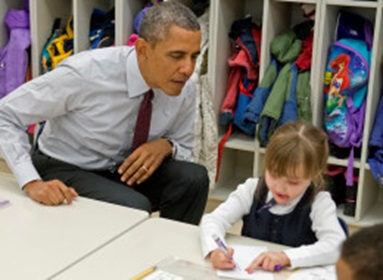
President Obama’s New Initiative Stresses the Need for Equality
President Barrack Obama’s latest initiative which will be launched on Monday stresses the need for equal access to quality teachers, across social-economic standing and ethnic backgrounds. The program called Excellent Educators for All aims to provide students from all backgrounds with good teachers by making the standards for education more stringent. By the beginning of 2015, all state schools will be asked to send in evaluations of all their teachers as well as plans for educator equity. This is also partly based on a law which was put into effect during former President George W. Bush’s era—the No Child Left Behind Act which requires states to reward and punish schools based on standardized test scores.
To help state schools come up with their plans, the Department of Education will be releasing a $4.2 million Education Equity Support Network that aims to supplement the knowledge and knowhow of educators throughout the United States. While these plans are already ready for implementation, there still isn’t any word as to how the Department of Education will be specifically defining “quality teachers.” 
Arne Dunan, the Secretary of Education says that they are trying to develop the program as they go along. Although surely, efforts will be made so that students from disadvantaged backgrounds aren’t left with inexperienced and under-qualified instructors. National surveys and federal data have shown that the most important core subjects are often those that are taught by teachers who aren’t properly certified, leaving a gaping hole in the education system.
In 2006, the Bush administration required states to detail their plans for evaluating teachers in compliance with the No Child Left Behind Act, however no follow-up was strictly enforced and very few changes came about as a result of the act. Arne Duncan says that it’s painful to watch students being put at a disadvantage by laziness—the state motto for this project is we have to do better.
Last week, the President had a dinner with teachers from different state schools. In his opening speech for the evening, he said that this new policy would be addressing the problem which is that kids who need good teachers the most are the ones being deprived of teachers who will help them learn. The key, President Obama said, is to highlight the problems and the key areas for improvement. The more the problem is ignored, the bigger it will continue to become.
Furthermore, the President addresses what he calls a reluctance of a lot of education officials to get moving—he says that a lot of the objections to the policy have come from a place of complacency and unwillingness to work. A lot of the time, the complaints which have been voiced out have been about the tediousness of the process and the cumbersome measures that would have to be taken. The President says that it’s this kind of thinking that makes it more difficult for progress to begin where state education reforms are involved. As of November 2013, the plan has gone into full implementation mode and is going to be refined and completed throughout the rest of 2014.
The National Education Association, the country’s biggest and arguably most influential teacher’s union is on board with the plan. President Dennis Van Roekel says that they’re a hundred percent in agreement with the President’s concerns. They say that equal equity and distribution of good teachers throughout the states are a must if they’re to salvage what American education means and stands for. Mr. Van Roekel says that their main concern is that clear accountability for the project—they want to make sure that clear roles are assigned to people, bodies and groups so that there is someone responsible for every aspect of the project. The thing, Mr. Van Roekel says about government efforts is that they tend to change with whoever is in office.
One of the most voiced out complaints about the project are that it is being put into full force so late into President Obama’s term. However, the President says that this shouldn’t hamper any of the progress—a lot can be done in the remaining time and short deadlines should never get in the way of working toward a better and brighter future for American students everywhere.
 + 1-888-827-0150
+ 1-888-827-0150 + 44-20-3006-2750
+ 44-20-3006-2750









